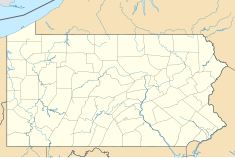Saint Nicholas Greek Orthodox Cathedral (Pittsburgh)
Saint Nicholas Greek Orthodox Cathedral located at 419 South Dithridge Street in the Oakland neighborhood of Pittsburgh, Pennsylvania, was designed by architect Thomas Hannah and built in 1904. The First Congregational Church built the structure and used it until 1921,[2] but it has been a Greek Orthodox Church since 1923.[3] Currently, it is part of the Greek Orthodox Archdiocese of America, and seat of the Greek Orthodox Metropolis of Pittsburgh. This Classical Revival style church building was added to the List of Pittsburgh History and Landmarks Foundation Historic Landmarks in 1982.[1]
| Saint Nicholas Greek Orthodox Cathedral | |
|---|---|
 | |
| Location | 419 South Dithridge Street (Oakland), Pittsburgh, Pennsylvania, USA |
| Coordinates | 40°26′40.08″N 79°56′59.91″W / 40.4444667°N 79.9499750°W |
| Built | 1904 |
| Architect | Thomas Hannah |
| Designated | 1982[1] |
Architecturally, the cathedral is described by Walter C. Kidney in his book Landmark Architecture: Pittsburgh and Allegheny County (1985) as:
A Grecian Ionic portico, executed in sandstone, is the grand and appropriate introduction to a church that has belonged to the Greek Orthodox Church since 1923. The exterior, with its big round-arched windows, is not otherwise specifically symbolic, but the interior is rich with paintings and mosaics. Notable inside are the painting in the dome of Christ the Pantocrator (Ruler of All), with its background of gold leaf, and the iconostasis of metal and mosaic, with peacocks finely depicted on the Royal Doors. Further art is to be found within the sanctuary, including a painting of the Mother and Child and a fresco of the Last Supper."[3]
Franklin Toker describes the structure in his book Pittsburgh: A New Portrait (2009) as follows: "Originally the First Congregational Church, until 1921, this is an unusually vigorous design in yellow industrial brick preceded by a dramatic Ionic portico. The interior of St. Nicholas should not be missed as an architectural paradigm of America itself: a cool Protestant interior heated up by a blazing iconostasis."[2]
References edit
- ^ a b Historic Landmark Plaques 1968-2009 (PDF). Pittsburgh, PA: Pittsburgh History & Landmarks Foundation. 2010. Retrieved 2012-04-02.
- ^ a b Toker, Franklin (2009). Pittsburgh: A New Portrait. University of Pittsburgh Press. p. 366. ISBN 978-0-8229-4371-6.
- ^ a b Kidney, Walter (1985). Landmark Architecture: Pittsburgh and Allegheny County. Pittsburgh History and Landmarks Foundation. p. 233. ISBN 0-916670-09-0.
External links edit
- St. Nicholas Greek Orthodox Cathedral Official website
